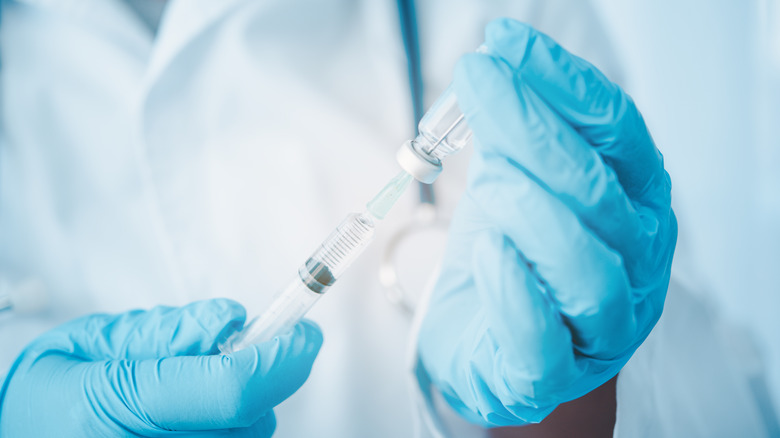Breakthrough Breast Cancer Vaccine Deemed Safe In Phase 1 Clinical Trials
Breast cancer accounts for about 30% of cancers in women every year, according to the American Cancer Society. Currently, the lifetime risk of a woman developing breast cancer is roughly 13%. Unfortunately, even if someone is in remission from breast cancer, it's possible to get breast cancer again. According to Cleveland Clinic, another breast cancer diagnosis can happen in 3-15% of breast cancer recurrence cases within 10 years.
Fortunately, researchers are looking into ways to boost immunity and effectively target breast cancer utilizing new treatments such as vaccines. A recent study in JAMA Oncology showed promising results of a vaccine to treat patients who have advanced-stage ERBB2-positive breast cancer. This phase one trial treated 66 patients with three doses of the vaccine. The ERBB2 gene, also known as HER2, activates certain types of cancers, mostly breast cancer (via My Cancer Genome). The study treated the patients and then followed up with them 10 years later.
What the study results yielded
Lead author of the study, Dr. Disis, told Medical News Today, "Vaccines will stimulate T-cells which can be programmed to hunt down these last remaining cells in the body and kill them. Stimulating effective immunity is the only way I know we can sterilize the body from all breast cancer cells." Not only did the vaccine demonstrate an immune response, but it showed that only 33% of patients reported flu-like symptoms and 36% reported fatigue.
Using the body's immune system to fight cancer is an exciting prospect, but it's not a new one. According to a 2017 study in Clinical Cancer Research, another vaccine safely boosted the T-cell response in HER2-positive patients. A 2014 study in Clinical Cancer Research tested a DNA vaccine to block the Mammaglobin-A (MAM-A), which is a breast cancer protein that is over-expressed in up to 80% of breast cancers.
According to Medical News Today, breast cancer is tough to treat because different types of breast cancers respond differently to treatments. Due to the fact that researchers are ramping up clinical trials of these vaccines to tackle breast cancers, you may see them available in clinics in about five years.


